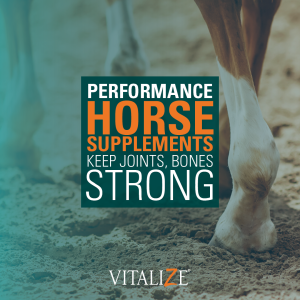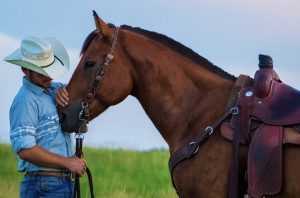
Parasites. Out of sight, out of mind. That’s why we don’t often think about them targeting our equine companions. But when parasites attack, they do so in ways that can lead to some heavy internal damage, including colic.
Taking preventative measures, including using horse dewormer, is a great step in keeping parasites away. However, first, we must understand the various parasites that attack our horses, the damage they cause and how to determine the best dewormer schedule.
Why Worry about Parasites?
Large internal parasite loads can be detrimental to your horse’s health. Externally, you may notice weight loss, poor growth, coarse and dull coats, potbellies and/or excessive tail scratching. Diarrhea is a common symptom in young horses infected with ascarids.
Different types of colic, including parasitic colic, can also occur from internal parasite infestations. While all symptoms are adverse, internal damage is more concerning for horses with parasite overload.
Before you start using horse dewormer, you will want to know what types of parasites live within your horses and how heavy the parasite load is. It is always best to consult with your veterinarian to establish a worming protocol.
Let’s explore the various parasites, the damage they cause and symptoms.
Types of Equine Parasites
Large Strongyles
Large Strongyles are the most dangerous but least common equine parasites. Horses acquire large strongyles by grazing in pastures covered with worm larvae. As they graze, they ingest grass and, consequently, the immature stage of the worm. The larvae pass through your horse’s gastrointestinal system and can invade the blood vessels of the cecum and colon, where they compromise gut function and vitality.
The worms are less common now, but it is important to stay on a horse dewormer protocol to prevent your horse from becoming infected.
Common symptoms of the large strongyle infection include:
- Weight loss
- Diarrhea
- Colic
Small Strongyles
Small Strongyles are more common than large strongyles. The way these worms cause symptoms and where they live within the gastrointestinal system is distinct. The larvae, or immature stage of small strongyles, burrow into the lining of your horse’s small intestine over winter after your horse has grazed contaminated pasture. The next spring, these encysted larvae come out of their winter homes in your horse’s gut lining in a mass exodus, causing significant damage to the intestines.
Symptoms can be similar to large strongyles but magnified. This is because there are typically more of the worm infesting your horse, resulting in more significant damage.
Ascarids (Roundworms)
Ascarids, commonly known as roundworms, make their homes in the small intestine of the gut. They are most common in foals and horses younger than 2. Roundworms can be particularly dangerous. Your horse can acquire this parasite from grazing. The worms can penetrate through the gut wall and migrate to the liver and/or lungs. They are then coughed up and swallowed, where they then develop into adults within the gastrointestinal system.
Since these worms can migrate to the lungs, symptoms can include:
- Respiratory disease
- Cough
- Nasal discharge
Tapeworms
Several tapeworm species exist, and each species inhabits a different part of your horse’s gut. The most common tapeworm, Anplocephala perfoliata, often causes impaction at the ileocecal junction. This will cause your horse to show signs of colic. Gastrointestinal ulceration can occur when the tapeworms attach to the inner lining of your horse’s gut.
Eggs are shed in feces occasionally, so they are often difficult to detect from fecal samples. Tapeworms also require an intermediate host, the mite. Once the eggs pass in your horse’s feces, the mites ingest the eggs, and then your horse will inadvertently ingest the mite when grazing pasture or eating hay.
Besides signs of colic, horses with tapeworms can show the following symptoms:
- Unthriftiness
- Anemia
Sometimes, the intestinal blockage is so great that surgery is required.
Pinworms
Pinworms will cause your horse to rub its tail and hind end. The female worm crawls out of the anus and lays her eggs on the skin in this region. Consequently, horses can spread pinworm eggs throughout their environment by constant rubbing.
Transmission can occur in stalls and from contact with grooming materials, tail wraps, posts, etc. Furthermore, pinworm eggs are hardy and can persist on the perianal region and in the environment for relatively long periods.
You should always follow the use of dewormers with a thorough cleansing of the area under and around the tail and anus to prevent reinfection.
Planning your Horse Dewormer Schedule
Deworming your horse strategically is essential to maintaining good health. Not only does the risk of colic increase with parasite burden, but these tiny worms also use the horse as a host.
Consequently, when parasites attack, the host’s ability to absorb nutrients decreases, as does its body condition, immune system, performance, effectiveness of vaccines and overall health. Therefore, it is important to implement a deworming program for your horse.
Strategic Deworming Considerations
You go to the feed store and pick up the dewormers you always use in the springtime. And then again in the fall. Are you ready to go? Before deworming your horse, it is critical to know which kinds of parasites your horse is vulnerable to and which products will treat those specific kinds.
To identify which are affecting your horse, a fecal egg count test can be performed by your veterinarian. Without the use of fecals, deworming is similar to throwing a dart at a dart board and hoping it sticks. Sometimes, you may succeed, while other times, you may miss out completely.
Fecal Egg Count (FEC) will allow you and your veterinarian to know more accurately which parasites your horses are impacted by. There are different recommendations for collecting fecal egg counts, which will be analyzed by your veterinarian.
Stay Proactive
However, the sampling starts with you. You typically need one or two fecal balls per horse. Keep these separate in airtight plastic bags until you can deliver them to the veterinarian.
Once your vet runs the test and analyzes eggs per gram of manure, you can collaborate on a horse dewormer program. Remember, the goal is to prevent parasites. It is impossible to totally eradicate these parasites. It is also not feasible, as there is a certain resistance to some commercial dewormers already.
Be sure to know the weight of your horse. If you don’t know your horse’s weight, there is a chance that you could underdose the amount of dewormer, which is also ineffective.
Rotational Deworming
If you don’t have the time, energy or financial means to collect fecal samples and do a biannual FEC, consider a rotational deworming system. Although perhaps not as effective, a common practice is to administer a horse dewormer to all horses every few months, rotating the class of dewormer used each time.
However, this leads to parasite resistance. Parasite resistance occurs when you treat worms with an ineffective product; even though it might kill 90% of the worms, those 10% are now resistant to that particular product. When that 10% breed and contaminate the environment, that type of wormer is now completely ineffective for those parasites.
Can you see where this could be a tremendous problem in your management program and our industry? What would happen if this occurred in all parasites? Eventually, all dewormer classes would become useless.
This is why it is crucial to know for certain what is going on inside your horse and on your property before deworming.
Keep Pastures, Stables Clean
We sometimes think only about the horse and keeping parasites out of our horses, but we must not overlook the environmental component of parasite control. When horses “shed” their worm eggs through the feces, those eggs will hatch, and the worms will crawl up the blades of grass in your pasture. The next horse to graze that area could now be infested by those parasites.
That is why it is vital to deworm horses before turning them out on fresh, green pasture each spring. It aids in keeping the pastures from contamination. It is also a good proactive measure to deworm any new horse that comes onto your property. This is because it could potentially bring a whole new batch of eggs onto your clean pasture.
Clean Pastures Mean Clean Horses
In addition to controlling any new parasites on the property, picking up and disposing of manure is another important task to contain the spread of eggs. Many people will spread their manure on grazing pastures, but this only permits possibly infested manure to cover more ground and gives parasites free transportation across your facility.
If spreading is the only option for your program, take advantage of empty pastures that are not being grazed and utilize them instead. Sitting manure also allows for excess flies and can contaminate water sources. It is best to pick up manure right away and dispose of it properly.
As always, there is no one-size-fits-all horse dewormer program. Each region, climate and horse are different, so work closely with your local veterinarian. By keeping a clean environment and using a horse dewormer program, you should be able to keep parasitic colic at bay.
Vitalize® Equine Gel Supports in Digestive Health After Worming
By following the horse dewormer tips above, you will have the best shot at decreasing the parasite load in and around your horses and increasing your overall equine health. However, deworming your horse can cause stress and a shift in the microbiome of the gut population.
Often, this can result in digestive upset in the form of diarrhea, going off feed or mild colic.
Additionally, when the body is under stress, the immune system cannot function up to its full potential. By administering Vitalize® Equine Gel after deworming, your horse’s immune system will get a boost, and its digestive system will stay on track.
Vitalize Equine Gel is a prebiotic and nutrient-rich gel for horses designed to give immediate support to the digestive and immune systems. It contains AO-Biotics® Amaferm®, a prebiotic research-proven to enhance digestibility and MOS (Mannan oligosaccharide) to help normalize hindgut microflora and support the immune system.
Vitalize Equine Gel works fast to support appetite and hydration.
Get your Vitalize Today!
Purchase your Vitalize Equine Gel at your local dealer. You can also purchase it online. Want to learn more about the Vitalize products that can give your horses #agoodgutfeeling? Sign up for our newsletter or visit our Vitalize Product Navigator.

